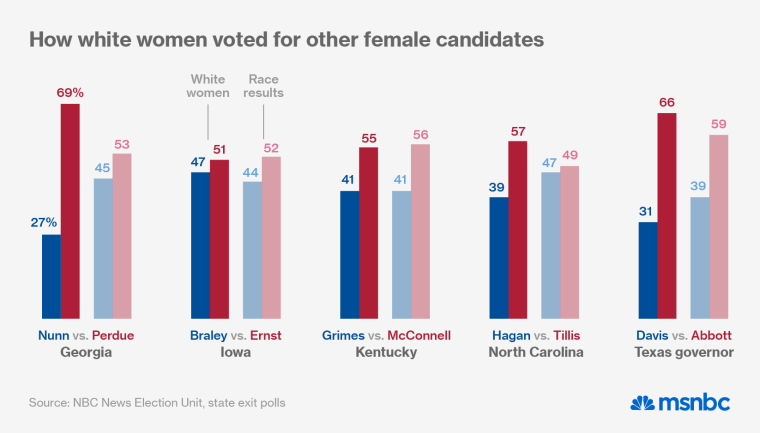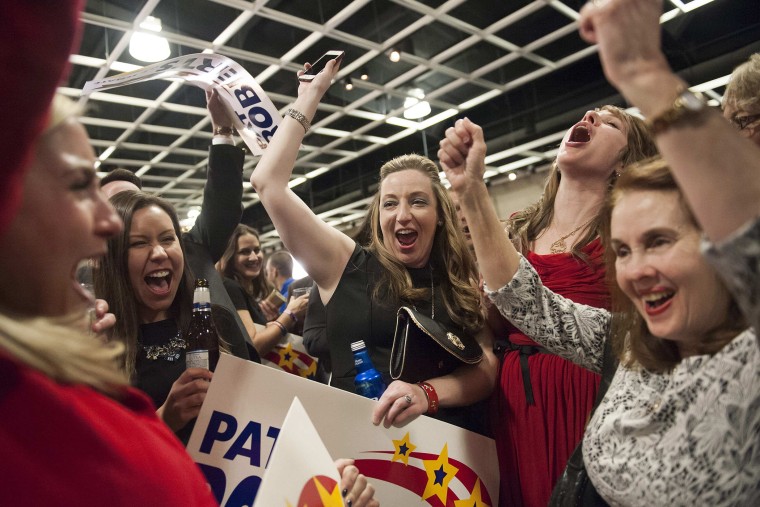Here are a few incontrovertible facts revealed by the exit polling from Tuesday’s election: White men are very angry about the direction the country is going, and white men both turn out and they vote for Republicans.
Beyond that, it gets complicated.
People like to talk about the women’s vote, but the truth is, there are crucial differences depending on how you slice it. For example, black women and white women’s voting behaviors diverge wildly: Black women are extremely reliable Democratic voters, even more so than black men; while white women are not so much. Nonetheless, there are still many more white people in the electorate.
RELATED: The 'night abortion lost'
Also, marriage matters. In recent years, Democrats have begun to eagerly focus on the fact that unmarried women are a growing demographic and tend to vote Democratic. That may be because they tend to be more economically vulnerable and interested in policies like the Affordable Care Act, or because Republicans have so often presented them as the root of evil, blaming them for poverty and crime, and depicting them as fonts of sexual licentiousness. In an ideal world for Democrats, the party would also gain a few votes from white married women who are freaked out by Republican views on reproductive rights, among other issues.

Unmarried women helped seal the deal for President Barack Obama and keep the Senate Democratic in 2012, and a similar strategy helped Terry McAuliffe become the governor of notably purple Virginia in 2013. The burning question for the midterm elections was whether any of these women would come out in the midterms — maybe not at 2012 levels, but ideally for Democrats, better than in 2010, a banner GOP year. The national exit poll showed that overall turnout by unmarried women wasn’t that much worse than in 2012: They made up 21% of the electorate, compared to 23% in the last presidential year. But Democratic support among those unmarried women dropped 7 points, from 67% voting for Democrats in 2012 to only 60% in 2014. And married women went for the GOP by 10 points.
Interestingly, unmarried men were about as likely to support a Republican as a Democrat, but married men supported Republicans by 24 points. Because so many married men turned out — they made the biggest single chunk of the electorate at 33% — Democrats were doomed.
RELATED: Why Democrats lost, according to everyone
How did Republicans chip away some unmarried women's support? It wasn't that Republican policies significantly changed, unless you count Colorado Senator-elect Cory Gardner repudiating his previous support for the state's personhood amendment (but holding onto the national version). Other winners on Tuesday included Thom Tillis, who as speaker of the North Carolina House, pushed through a laundry list of ultra-conservative legislation, including abortion restrictions, as well as unrepentant personhood supporter Joni Ernst. Democrats' biggest problem seemed to be convincing persuadable people — among them, white women — that these candidates were too extreme to be elected, as they were able to with Todd Akin and Richard Mourdock in 2012, and Ken Cuccinelli in 2013. The argument was difficult to make especially when Tillis and Gardner were out enthusing about making the pill over the counter.
In certain states, the results were particularly devastating for Democrats. Women made up only 47% of the electorate in Colorado, according to exit polls, compared to 56% in the last midterm election in 2010. And despite the fact that Democrat Mark Udall in Colorado and pro-choice allies repeatedly pointed to Gardner’s positions on reproductive rights —including his support for a national personhood bill — one-third of the people who voted against the personhood amendment turned around and voted for Gardner. (Who voted for personhood? White evangelicals, 57% of Republican men and 51% of Republican women.) While Udall won unmarried women by 36 points, there simply weren't enough of them to make a difference.
Newly re-elected Republican leader Mitch McConnell said often on the campaign trail this year that he was "proud of my enemies." Democrats are likely hoping for some enemies to be proud of in the future — preferably ones that look more like the 2012 crop than this year.
